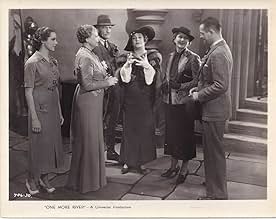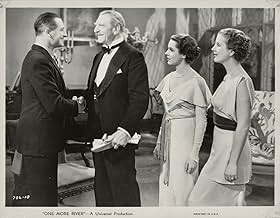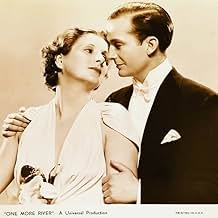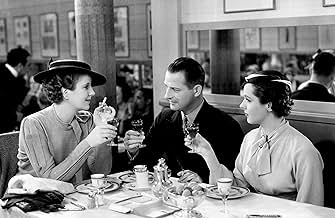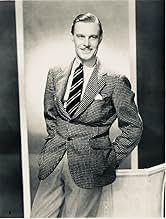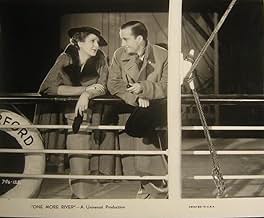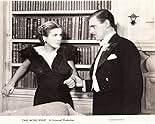Agrega una trama en tu idiomaA young lady leaves her brutal husband and meets another man aboard a ship.A young lady leaves her brutal husband and meets another man aboard a ship.A young lady leaves her brutal husband and meets another man aboard a ship.
- Dirección
- Guionistas
- Elenco
- Dirección
- Guionistas
- Todo el elenco y el equipo
- Producción, taquilla y más en IMDbPro
Opiniones destacadas
"Claire" (Diana Winyard) is married to aspiring politician "Sir Gerald" (Colin Clive) but he's a bit of a brute. It's an incident with a riding crop that finally sends his wife on a cruise where she encounters "Croom" (Frank Lawton). Unfortunately, her husband cannot be seen to not have his wife at his side and so when she flatly refuses a reconciliation, he sets in motion a public divorce that will call the integrity of not just her, but of her new companion into question. Of course, though still entirely platonic, we know that the relationship between the two has burgeoned somewhat - but this isn't really a film about a romance. It's a rather sad indictment of a judicial system that still looked upon a woman as the property of her husband. Not in a feudal sense, but that she might accuse such a prominent and respectable man of ill-treating her was a charge that was always going to fall on deaf ears. It's the ensuing court hearing that brings this to life a bit, with some sparky sparring from lawyers "Brough" (Lionel Atwill), "Forsythe" (Alan Mowbray) and the inquisitive judge (Gilbert Emery) quite cleverly showcasing the one-sidedness of the whole affair. The film also befits from a great cast of supporting favourites who feature sparingly but add depth to a story of state-supported prejudice that Winyard holds together quite well.
A woman finds herself sued for divorce by the brutish husband who beat her with a riding whip. The kind of situation that would be unthinkable today but which was probably considered to be quite saucy back in the 1930s, despite the terribly proper tone of R. C. Sheriff's screenplay. When Dana Wynyard and Frank Lawton both gaze beyond the camera, and he says, ever so matter-of-factly, "You realise, of course, that I love you," it's impossible not to laugh. It's a pleasant enough watch, but it's tone is inconsistent and often inappropriately humorous
This is one of Whale's favorites among his own works (the director even gave himself an uncredited bit!) but which he only got Universal to bankroll by accepting to helm another fantasy project for them, the subsequently aborted "A Trip To Mars". Anyway, this obscurely-titled melodrama is based on John Galsworthy (best-known for "The Forsythe Saga")'s last novel – adapted by the equally distinguished R.C. Sheriff. It tells of the vicissitudes of a young wife (Diana Wynyard, fresh from an Oscar nomination for the previous year's Best Picture winner CAVALCADE), about to be divorced from her brutish husband (a brief but typically impressive turn from Whale regular Colin Clive), who unwittingly adds coal to the fire via her initially platonic relationship with a young man (Frank Lawton, soon to play his most notable role as the grown-up David COPPERFIELD [1935]). The narrative also has a strong political element to it, not just in view of the subplot involving the electoral climate (personified by Reginald Denny's newly-appointed MP), but in the heroine's emancipation from the rigid status quo pertaining to woman's role in society.
While undeniably dated, the film boasts splendid cinematography and sets (by BRIDE OF FRANKENSTEIN's John J. Mescall and Charles D. Hall respectively) – the latter would be memorably refurbished and re-used for the Mary Shelley prologue and the Baron's own abode in that very film which rather suggests that the art director/set decorator's craft is not nearly appreciated enough! Apart from this, we get a truly remarkable supporting cast: lovely Jane Wyatt (as Wynyard's kid sister), C. Aubrey Smith (their father), Henry Stephenson (an uncle), the oddly-named Mrs. Patrick Campbell (hamming it up as his outspoken wife – apparently, she was like that in real-life too!), Lionel Atwill (the wily but pompous Prosecutor), Alan Mowbray (the defense counsel), Gilbert Emery (the genial Judge) and E.E. Clive (the other Clive's resourceful private detective).
Finally, the copy I acquired was sourced from an old TV broadcast off the U.K.'s Channel 4: despite a couple of intermissions for publicity spots(!), the quality is surprisingly adequate – much better, in fact, than that for most of the other Whales I have been watching lately.
While undeniably dated, the film boasts splendid cinematography and sets (by BRIDE OF FRANKENSTEIN's John J. Mescall and Charles D. Hall respectively) – the latter would be memorably refurbished and re-used for the Mary Shelley prologue and the Baron's own abode in that very film which rather suggests that the art director/set decorator's craft is not nearly appreciated enough! Apart from this, we get a truly remarkable supporting cast: lovely Jane Wyatt (as Wynyard's kid sister), C. Aubrey Smith (their father), Henry Stephenson (an uncle), the oddly-named Mrs. Patrick Campbell (hamming it up as his outspoken wife – apparently, she was like that in real-life too!), Lionel Atwill (the wily but pompous Prosecutor), Alan Mowbray (the defense counsel), Gilbert Emery (the genial Judge) and E.E. Clive (the other Clive's resourceful private detective).
Finally, the copy I acquired was sourced from an old TV broadcast off the U.K.'s Channel 4: despite a couple of intermissions for publicity spots(!), the quality is surprisingly adequate – much better, in fact, than that for most of the other Whales I have been watching lately.
I enjoyed this film, but must be nearly alone in not particularly finding Diana Wynyard appealing in any real way, in her role as the unhappy, abused wife. Jane Wyatt on the other hand, as her sister, is sophisticated and lovely, very Myrna Loy.
Having read lots of books set in Edwardian England, I am familiar with the often ludicrous plots involved in setting up divorces and cases of criminal conversation. If you accept that the laws were limited and often ridiculous, you can overlook what seems so old-fashioned.
It is amusing to see Mrs. Patrick Campbell in action; she is a grand ham. The part of the abusive husband is a stereotype; he is oily and creepy and cruel. The new love is the opposite of course, charming and kind and gentle.
Overall a well-made film; just wish it had been made a year earlier before the draconian production code took over.
Having read lots of books set in Edwardian England, I am familiar with the often ludicrous plots involved in setting up divorces and cases of criminal conversation. If you accept that the laws were limited and often ridiculous, you can overlook what seems so old-fashioned.
It is amusing to see Mrs. Patrick Campbell in action; she is a grand ham. The part of the abusive husband is a stereotype; he is oily and creepy and cruel. The new love is the opposite of course, charming and kind and gentle.
Overall a well-made film; just wish it had been made a year earlier before the draconian production code took over.
James Whale was known for his horror movies, including 1931's "Frankenstein," 1932's "The Old Dark House," and 1933's "The Invisible Man." As a former stage director, Whale harkened back to his live theatre days and tackled a subject that some considered foreboden in August 1934's "One More River," a film released just before his 1935's "The Bride of Frankenstein."
The adaptation of the John Galsworthy 1933's novel of the same name, Whale's "One More River" was the first to aggressively test the new Production Code Administration (PCA), led by Joseph Breen. A movie on a husband's sadism towards his wife in the middle of an abusive marriage could have passed the censors in the Pre-Code era, but was taboo during the Breen reign. Whale and his associates had difficulty getting the jest of Galsworthy's themes passed by the Hays Office that ran the PCA. But Whale subtly unfolded "One More River's" more unsavory moments that can be picked up by the observant viewer. Clare (Diana Wynyard) had decided to leave her abusive husband, Sir Gerald Corven (Colin Clive), and her home in Sri Lanka. On the way back to England on an ocean liner, Clare meets a sympathetic young man, Tony Croom (Frank Lawton). Her jealous husband discovers the platonic relationship between the two and tries to get even with her in a highly-publicized domestic trial.
Film historian William Everson labeled "One River More" Whale's masterpiece. "It is by far Hollywood's most successful attempt at putting any subject of England on the screen, not even excepting Cavalcade," he wrote. "It represents the fullest flowering of Whale's unique, richly theatrical yet wholly cinematic style."
Universal Pictures persuaded England's superstar lady of the stage, Mrs. Patrick Campbell, to play Lady Mont, a friend of Clare's, in one of her a handful of movies she appeared. Playwright George Bernard Shaw was a huge fan of Mrs. Campbell, and was so inspired by her acting he based a number of his plays on her. One work was Eliza Doolittle in his 1913 "Pygmalion," later remade into the stage musical and movie "My Fair Lady." Even though she was married, the two had a close friendship, which, judging by the letters he wrote to her, Shaw wanted their relationship to be even closer. Campbell, by all accounts, wasn't exactly enamored about being on the screen. The actress quipped about love making being shown to all by famously saying, "My dear, I don't care what they do, so long as they don't do it in the street and frighten the horses." Mrs. Campbell first arrived on the set requesting from Whales, "I would like to look like a woman called '(Greta) Garbo." When she saw her character on the screen, she retorted, "I look like a little chest of drawers."
"One More River" is also known as Jane Wyatt's film debut. The New Jersey-born and Manhattan-raised daughter of an investment banker, Wyatt possessed a love for the stage, attending apprentice school at the Berkshire Playhouse in Stockbridge, Massachusetts. Wyatt easily made the transition from the Broadway stage to Hollywood as Dinny Charwell, sister of Clare. Famous for her appearances in films such as Frank Capra's 1937 "Lost Horizon" and 1947's "Gentleman's Agreement," she ran into a buzzsaw during the McCarthy hearings with her outspoken defense of the senator's targets. She is most remembered as Margaret Anderson in television's 'Father Knows Best' series.
"One More River" was a mediocre performer at the box office and has since been relegated just to those studying director Whale's body of work. But as historian William Everson noted, "Perhaps more than any other film currently available, it deserves 'Rediscovery.' "
The adaptation of the John Galsworthy 1933's novel of the same name, Whale's "One More River" was the first to aggressively test the new Production Code Administration (PCA), led by Joseph Breen. A movie on a husband's sadism towards his wife in the middle of an abusive marriage could have passed the censors in the Pre-Code era, but was taboo during the Breen reign. Whale and his associates had difficulty getting the jest of Galsworthy's themes passed by the Hays Office that ran the PCA. But Whale subtly unfolded "One More River's" more unsavory moments that can be picked up by the observant viewer. Clare (Diana Wynyard) had decided to leave her abusive husband, Sir Gerald Corven (Colin Clive), and her home in Sri Lanka. On the way back to England on an ocean liner, Clare meets a sympathetic young man, Tony Croom (Frank Lawton). Her jealous husband discovers the platonic relationship between the two and tries to get even with her in a highly-publicized domestic trial.
Film historian William Everson labeled "One River More" Whale's masterpiece. "It is by far Hollywood's most successful attempt at putting any subject of England on the screen, not even excepting Cavalcade," he wrote. "It represents the fullest flowering of Whale's unique, richly theatrical yet wholly cinematic style."
Universal Pictures persuaded England's superstar lady of the stage, Mrs. Patrick Campbell, to play Lady Mont, a friend of Clare's, in one of her a handful of movies she appeared. Playwright George Bernard Shaw was a huge fan of Mrs. Campbell, and was so inspired by her acting he based a number of his plays on her. One work was Eliza Doolittle in his 1913 "Pygmalion," later remade into the stage musical and movie "My Fair Lady." Even though she was married, the two had a close friendship, which, judging by the letters he wrote to her, Shaw wanted their relationship to be even closer. Campbell, by all accounts, wasn't exactly enamored about being on the screen. The actress quipped about love making being shown to all by famously saying, "My dear, I don't care what they do, so long as they don't do it in the street and frighten the horses." Mrs. Campbell first arrived on the set requesting from Whales, "I would like to look like a woman called '(Greta) Garbo." When she saw her character on the screen, she retorted, "I look like a little chest of drawers."
"One More River" is also known as Jane Wyatt's film debut. The New Jersey-born and Manhattan-raised daughter of an investment banker, Wyatt possessed a love for the stage, attending apprentice school at the Berkshire Playhouse in Stockbridge, Massachusetts. Wyatt easily made the transition from the Broadway stage to Hollywood as Dinny Charwell, sister of Clare. Famous for her appearances in films such as Frank Capra's 1937 "Lost Horizon" and 1947's "Gentleman's Agreement," she ran into a buzzsaw during the McCarthy hearings with her outspoken defense of the senator's targets. She is most remembered as Margaret Anderson in television's 'Father Knows Best' series.
"One More River" was a mediocre performer at the box office and has since been relegated just to those studying director Whale's body of work. But as historian William Everson noted, "Perhaps more than any other film currently available, it deserves 'Rediscovery.' "
¿Sabías que…?
- TriviaAccording to Jane Wyatt, "[James Whale] was crazy about Mrs. Pat [Mrs. Patrick Campbell]. The set was kind of run for her. The whole thing was to get her relaxed. She was playing up a lot about how nervous she was, and I think she got an awful lot of attention that way. i think we felt sorry for Mrs. Campbell. Poor dear--how ever are they going to pull her together. That was my reaction. We all had to pull her together and help her through.
- ErroresIn the opening scene, the liner pulling into the London dock that lady Corven arrives on is seen in the establishing shot is clearly named the ORFORD, yet after a we see her and Tony speak on the deck, another establishing shot of the ship now shows it is one called the ORSOVA.
- ConexionesReferenced in Dioses y monstruos (1998)
Selecciones populares
Inicia sesión para calificar y agrega a la lista de videos para obtener recomendaciones personalizadas
Detalles
- Fecha de lanzamiento
- País de origen
- Idioma
- También se conoce como
- Över floden
- Locaciones de filmación
- Productora
- Ver más créditos de la compañía en IMDbPro
- Tiempo de ejecución1 hora 28 minutos
- Color
- Relación de aspecto
- 1.37 : 1
Contribuir a esta página
Sugiere una edición o agrega el contenido que falta

Principales brechas de datos
By what name was One More River (1934) officially released in Canada in English?
Responda
